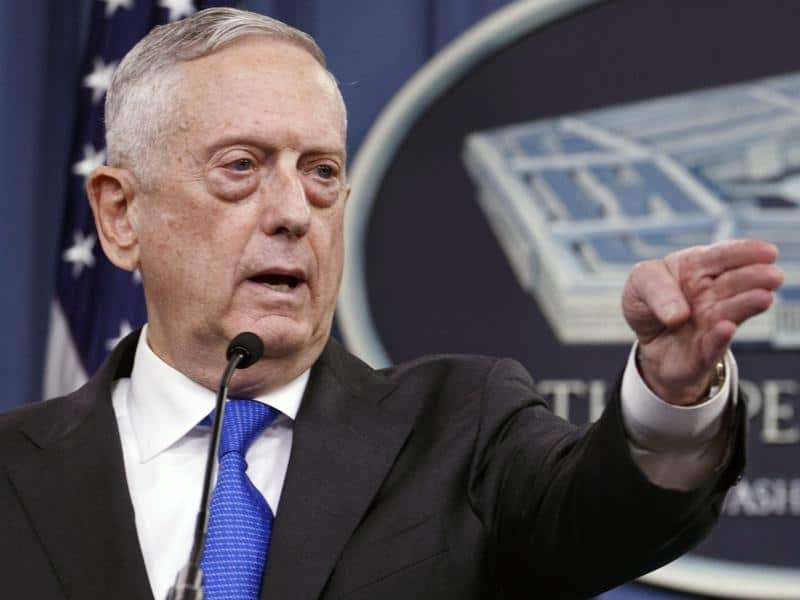Two top officials from the administration of President Donald Trump sought Wednesday to persuade US lawmakers to maintain America's increasingly contentious backing of Saudi Arabia in the war in Yemen, arguing that pulling back would worsen the brutal conflict.
Secretary of State Mike Pompeo and Defense Secretary Jim Mattis appeared before the Senate ahead of a planned vote on reducing military assistance to Riyadh, which has been blamed for high civilian death rates in Yemen strikes and is facing global ire over the death of dissident Saudi journalist Jamal Khashoggi.
"The suffering in Yemen grieves me, but if the United States of America was not involved in Yemen, it would be a hell of a lot worse," Pompeo said, according to prepared remarks from the closed-door hearing.
"What would happen if the US withdrew from the Yemen effort? The war wouldn't end."
The Yemen conflict has triggered the world's worst humanitarian crisis, with the country now on the brink of famine.
The UN estimates as many as 10,000 people have died, most of them civilians, since the coalition launched military operations in 2015.

More than 80,000 children in Yemen have died from starvation, charity Save the Children says. Source: AAP
US military backing to the Saudi-led coalition is based on non-combat support, such as the sharing of intelligence and training pilots in the "best practices" of conducting air strikes with minimal civilian casualties.
The Pentagon had also been conducting air-to-air refueling for coalition aircraft, but this month said it was stopping doing so.
Still, a series of high-profile coalition strikes has killed scores of civilians, many of them children, and now some US politicians are balking at America's role in the war.
Peace talks
Trump's emphatic support of Riyadh has rankled lawmakers including from his own Republican partly, particularly following Khashoggi's murder.
Saudi Arabia has acknowledged that the Washington Post columnist, a US resident, was killed inside the kingdom's Istanbul consulate in October but has blamed his death on a "rogue operation."
Trump last week called Saudi Arabia a "steadfast partner" and said it was unclear whether Crown Prince Mohammed bin Salman was aware of the plan to kill Khashoggi.
Trump has also cast doubt on the CIA's reported conclusion that the crown prince, also known as MBS, was behind the killing.
After Wednesday's hearing, Pompeo told reporters he'd seen no "direct" evidence linking MBS to Khashoggi's murder.
Peace talks aimed at ending the war in Yemen have been set for early December in Sweden, between Huthi rebels and the UN-recognised government, Mattis said last week, and officials are worried a move to cut support ahead of the summit is poorly timed.
Senators could vote as early as Wednesday on a bipartisan proposal that would force the US to end its backing of the Saudi-led coalition in Yemen.
Other lawmakers want to impose sanctions beyond those that Washington slapped on 17 Saudis allegedly involved in the killing.

US Defense Secretary Jim Mattis. Source: AP
The events have left administration officials publicly grappling with global realpolitik, saying Saudi Arabia's role in countering Iran is too important for the US to turn its back.
"We are seldom free to work with unblemished partners," Mattis said in prepared remarks.
"Long-standing relationships guide but do not blind us. Saudi Arabia, due to geography and the Iranian threat, is fundamental to maintaining regional and Israeli security, and to our interest in Mideast stability."
'Necessary strategic partner'
The Pentagon chief added the US must try to hold those responsible for Khashoggi's murder to account while also recognising Saudi Arabia as a "necessary strategic partner."
"We cannot be deflected from using all our influence to end this war for the good of innocent people in trouble, and ultimately the safety of our own people, and this includes our military engagement," he said.
Mattis pointed to the US military's training of partner pilots as key in reducing deaths.
"While tragedies occur in war, we assess restraint and improved tactical judgment by Arab coalition pilots has reduced the risk of civilian casualties," he said.
Pompeo meanwhile warned lawmakers that a US drawdown would lead to a stronger Iran, while reinvigorating both the Islamic State group and Al-Qaeda in the Arabian Peninsula.
"Try defending that outcome back home," he said.
On Twitter, Pompeo announced the US would be spending an additional $131 million in food assistance and again took a swipe at Iran.
"Iran's regime has no interest in easing Yemeni suffering; the mullahs don't even care for ordinary Iranians. Saudi Arabia has invested billions to relieve suffering in #Yemen. Iran has invested zero," he tweeted.
Also on Twitter, Democratic Senator Ed Markey said Pompeo is wrong to say Saudi Arabia is worth keeping as a partner, given its human rights record.
"Leadership isn't about an amoral pursuit of material benefit & profit. It's about applying our values to friends & foes alike, even when - especially when - it's hard," he wrote.
Saudi Arabia and its allies intervened in the conflict between embattled Yemeni President Abedrabbo Mansour Hadi, whose government is recognized by the United Nations, and the Huthis in 2015.


